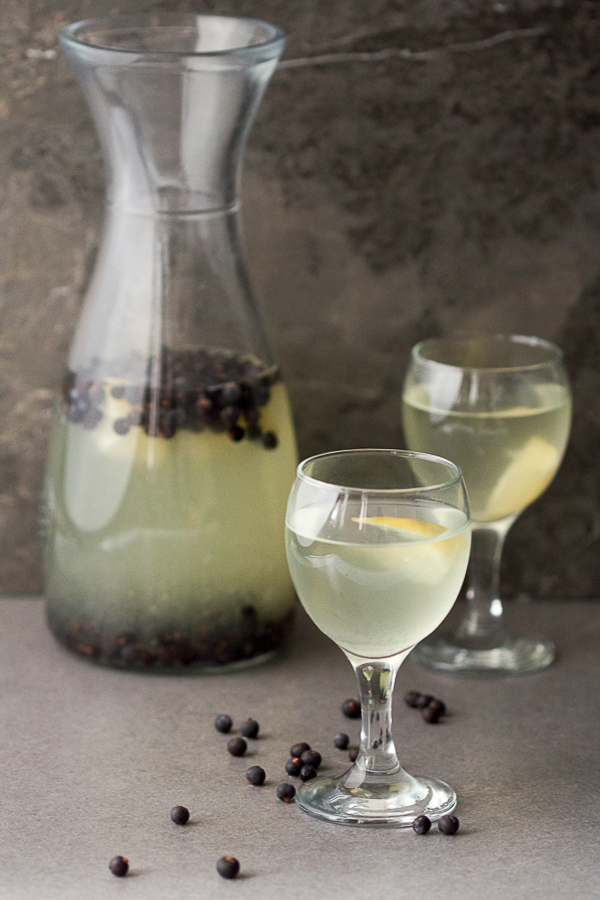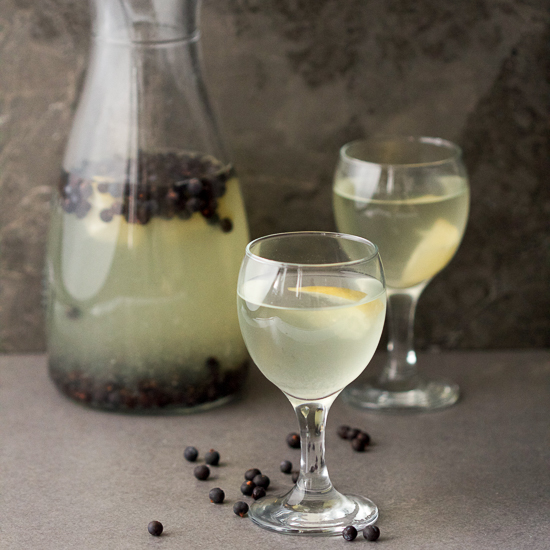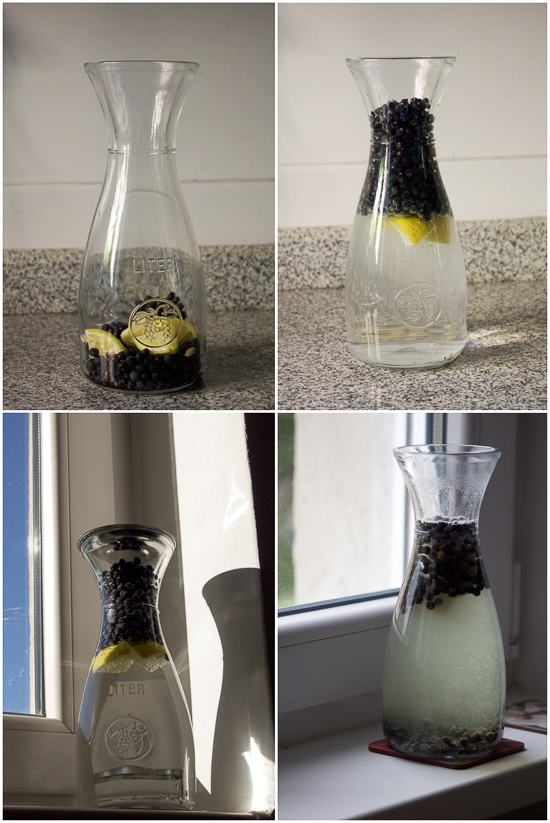Smreka: Fermented Juniper Berry Juice
Fermented
Juniper Berry Juice (aka smreka), is a sour and refreshing,
lemonade-like beverage, perfect for quenching the thirst on a warm
evening.

Almost everyone who comes to Sarajevo in late spring is surprised by the variety of unusual yet tasty homemade juices available at local cafes. Come May, there’s the ubiquitous zova made out of the elder tree flowers (also known as zova) which blossom around that time. There is also the fantastic rose juice (sok od ruže or djul šerbe), made from local wild rose petals.
And then there is smreka – the fermented juniper berry juice.
Have you tried it? If not, you should! Because smreka is simply perfect.
Although the mention of fermented plants evokes the taste of sauerkraut, think of juniper berry juice as a “more sour than usual” lemonade that can be consumed as is, or made sweeter with honey or sugar. It’s very refreshing, and perfect to go along with local desserts such as the walnut stuffed apples (tufahije).
People take to smreka quickly, and some make their own after returning home. I’ve had a few requests for a while, and below is the recipe I’ve used with great success.
(As with anything fermented, there is no rule that’s cut in stone. You may like to ferment berries without lemon. You may like to leave the juice to ferment longer than 10-15 days. Or you may think 7 days is enough. Fermenting recipes are more of a framework within which you’ll figure out your own preferences.)
In addition to this juice, juniper berry is known for being an active ingredient in several other Balkan delicacies, including the homemade juniper berry brandy (rakija klekovača), as well as gin.
The plant itself is said to have many different health benefits, and is widely used in the area. The juice is an excellent diuretic, and is also recommended as an aid against coughing, asthma, stomachaches and uti’s. It’s said to be especially effective for stomach problems of all sorts, and is often recommended by the doctors here to patients suffering with kidney stones. When made into oil, juniper berries are excellent to use in massaging areas affected by the rheumatoid arthritis.
P.S. We’ve done additional interesting beverages before. Do you remember sour cherry liqueur? Or the elderflower cordial? If you don’t feel like fermenting drinks, how about some white wine lemonade?


Almost everyone who comes to Sarajevo in late spring is surprised by the variety of unusual yet tasty homemade juices available at local cafes. Come May, there’s the ubiquitous zova made out of the elder tree flowers (also known as zova) which blossom around that time. There is also the fantastic rose juice (sok od ruže or djul šerbe), made from local wild rose petals.
And then there is smreka – the fermented juniper berry juice.
Have you tried it? If not, you should! Because smreka is simply perfect.
Although the mention of fermented plants evokes the taste of sauerkraut, think of juniper berry juice as a “more sour than usual” lemonade that can be consumed as is, or made sweeter with honey or sugar. It’s very refreshing, and perfect to go along with local desserts such as the walnut stuffed apples (tufahije).
People take to smreka quickly, and some make their own after returning home. I’ve had a few requests for a while, and below is the recipe I’ve used with great success.
(As with anything fermented, there is no rule that’s cut in stone. You may like to ferment berries without lemon. You may like to leave the juice to ferment longer than 10-15 days. Or you may think 7 days is enough. Fermenting recipes are more of a framework within which you’ll figure out your own preferences.)
In addition to this juice, juniper berry is known for being an active ingredient in several other Balkan delicacies, including the homemade juniper berry brandy (rakija klekovača), as well as gin.
The plant itself is said to have many different health benefits, and is widely used in the area. The juice is an excellent diuretic, and is also recommended as an aid against coughing, asthma, stomachaches and uti’s. It’s said to be especially effective for stomach problems of all sorts, and is often recommended by the doctors here to patients suffering with kidney stones. When made into oil, juniper berries are excellent to use in massaging areas affected by the rheumatoid arthritis.
P.S. We’ve done additional interesting beverages before. Do you remember sour cherry liqueur? Or the elderflower cordial? If you don’t feel like fermenting drinks, how about some white wine lemonade?

Fermented Juniper Berry Juice (Smreka)
-
 Prep Time: 5 mins
Prep Time: 5 mins -
 Total Time: 5 mins
Total Time: 5 mins -
 Category: Beverage
Category: Beverage
Ingredients
- 1/2 lemon
- 1 cup dry juniper berries
- 4 cups water
Instructions
- Wash lemon well, and quarter it leaving the skin on. Combine with juniper berries and place in a large glass 1-liter bottle (or jar). Fill with water all the way and close the lid loosely.
- Leave bottle in a sunny and warm spot on the window seal (or the terrace), for 10-15 days. A lot of juniper berries will start sinking to the bottom, or travel up and down in the bottle, while water will become yellowish. This is your sign that the juice is ready.
- When getting ready to consume the juice, taste and see if it’s to your liking. If it’s too strong, dilute with a little bit of regular or mineral water. Add a teaspoon of sugar as well if you prefer.
- Meanwhile, repeat the process to make more juice with the same berries. Transfer them back into the original bottle, add a new quartered lemon, fill them up with water, and leave in a sunny spot. You can reuse berries once or twice. When most of them stay on the bottom, and the juice is no longer flavorful, they’re ready to be discarded.


EmoticonEmoticon